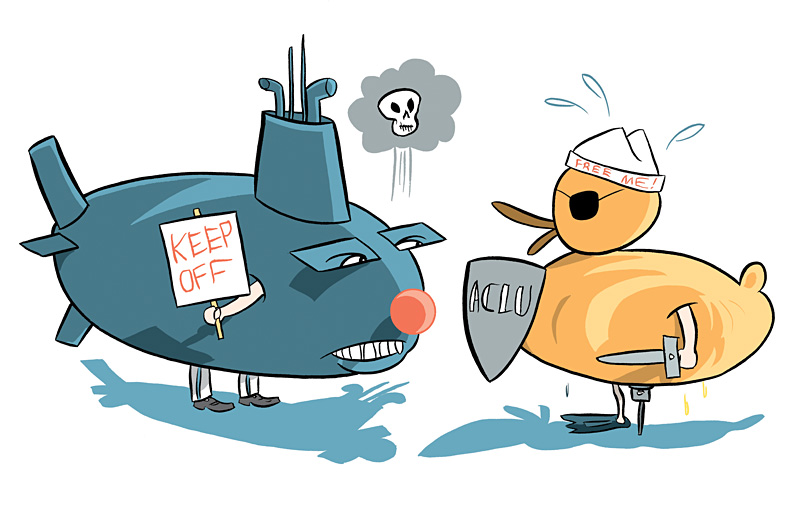Homeland Security and the U.S. Coast Guard call it a safety zone. It’s a watery sector extending 100 yards into Elliott Bay from Pier 66. And it will be off limits to boaters for 12 hours starting at 8 a.m. August 4, as Navy warships parade in for Seafair.
The Coast Guard has put restrictions on the area in the past during Seafair’s Fleet Week, but proposed earlier this year to make the no-go zone a permanent fixture of the festival. Restrictions are needed in order to ensure that emergency response craft have “unobstructed access,” the Coast Guard says.
But the proposed rule also means that Navy ships, some nuclear-powered, will find it easier to avoid Glen Milner and his noisy boatload of antiwar protesters, who like to bring their message to the thousands of spectators gathered on the waterfront.
“The Navy often states it exists to defend our freedoms, but this proposed [permanent] no-protest zone shows how false that is,” says Milner, who has been busted in the past by the Coast Guard, among others, for his nonviolent protests.
Michelle Jensen, a Seattle attorney representing ACLU of Washington, says the proposed rule violates the First Amendment. If it’s approved, she wrote in a recent letter to the U.S. Dept. of Transportation, “we are prepared to litigate its constitutionality.”
The Navy is not disclosing in advance what vessels will be at this year’s event. But in past years, Trident submarines—complete with nuclear warheads—and warships equipped to fire radioactive munitions have sailed into the downtown Seattle pier, located at Bell Street. Antiwar demonstrators have been floating out with protest signs to meet them since 2000, says Milner, whose group is called the Ground Zero Center for Nonviolent Action. Protesters’ boats, says Milner, have regularly been boarded by the Coast Guard, preventing Ground Zero from demonstrating its concerns about war, particularly the nuclear kind.
Two years ago, the Coast Guard established a 400-yard “box” surrounding Pier 66, and though the zone is now reduced to 100 yards, Milner’s group—familiar sights at the gates of the Bangor, Wash., N-sub base on Puget Sound—still wouldn’t be close enough to gain public attention, says Milner. “The Coast Guard makes the rules, enforces the rules, and then prosecutes violators in their own Coast Guard court system,” he says. “It shows us what a true police state would look like if the Coast Guard were in charge.”








